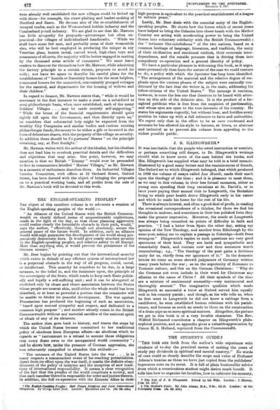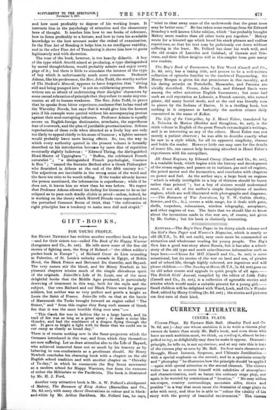THE STUDENT'S GUIDE..
" THIS book sets forth from the author's wide experience with students of to-day the practical means of making the years of study pay dividends in spiritual and mental mastery." No words of ours could so clearly describe the scope and value of Profeattor Adams's treatise as those we have just copied from the publishers' Ingenuous note on its cover. It is full of plain businesslike advice. from which a conscientious student might derive much benefit. It tells bins how to organise his faculties, how to cultivate his memory, Tire Life of d. 7t. Ilibtysoorth. Edited by ids wife. Lenses Murray.
ilea. bd. net.1
Wks &Waal, Doide. Jolts Adams, M.A., Bac., LL.D. &mace: at the Valvessitr kmas. at ed. not.' . and how moat profitably to dispose of his working hours. It instructs him in the psychology of attention and the elementary laws of thought. It teaches him how to use books of reference, how to listen profitably to a lecture, and how to turn his available knowledge to the best account under the ordeal of examination. In the Fine Art of Reading it helps him to an intelligent rapidity, and in the other Fine Art of Translating it shows him how to guess legitimately and with discretion.
The torte of the book, however, is too heavily didactic. A boy of the type which Arnold aimed at producing, a type distinguished by moral thoughtfulness, would probably admire and enjoy every page of it ; but there is little to stimulate the interest of the type of boy which is unfortunately much more common. Professor Adams, like his predecessor, the Rev. John Todd, the worthy author of The Student's Manual, appears to have forgotten that " sitting still and being pumped into " is not an exhilarating process. Both writers are no afraid of amdennining their disciples' characters by some casual relaxation of principle that theyrefuse to make any con- cession at all to human weakness, The Rev. John Todd, to prove that he speaks from bitter experience, confesses that hohas read all the Waverley Novels, but says that it would give him the keenest pain if his example were quoted without his accompanying protest against their soul-corrupting influence. Professor Adams is equally severe on English-foreign dictionaries, armchairs, the superfluous fear of overwork, and the plea of justifiable procrastination. Solemn reprobations of these evils when directed at a lively boy are only too likely to appeal chiefly to his sense of humour ; a lighter manner would probably leave more lasting effects. So, too, the way in which every authority quoted in the present volume is formally described on his introduction becomes by mere dint of repetition eventually slightly ludicrous : " Edward Thring, the distinguished Head-blaster of Uppingham " ; " Buffon, the celebrated French naturalist " ; "a distinguished French psychologist, Gustave Is Bon " ; "named the Socratic Method after a Greek Philosopher who flourished iu Athens at the end of the fifth century D.C." The adjectives are inevitable in the wrong sense of the word and the facts too trite to be worth telling. If the reader already knows the person mentioned, the information is superfluous ; while if he does not, it leaves him no wiser than he was before. We regret that Professor Adams allowed his feeling for literature to be so far eclipsed as to pass such deadly cliches in proof—unless, indeed, he is working on the theory which Hurrell Froude once expounded to the perturbed Common Room of Oriel, that "the cultivation of right principles has a tendency to make men dull and stupid."















































 Previous page
Previous page